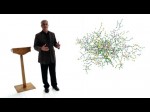
If You’re So Free, Why Do You Follow Others? The Sociological Science Behind Social Networks and Social Influence. Nicholas Christakis, Professor of Medical Sociology, Medicine, and Sociology at Harvard University If you think you’re in complete control of your destiny or even your own actions, you’re wrong. Every choice you make, every behavior you exhibit, and even every desire you have finds its roots in the social universe. Nicholas Christakis explains why individual actions are inextricably linked to sociological pressures; whether you’re absorbing altruism performed by someone you’ll never meet or deciding to jump off the Golden Gate Bridge, collective phenomena affect every aspect of your life. By the end of the lecture Christakis has revealed a startling new way to understand the world that ranks sociology as one of the most vitally important social sciences. The Floating University Originally released September 2011. Additional Lectures: Michio Kaku: The Universe in a Nutshell www.youtube.com Joel Cohen: An Introduction to Demography (Malthus Miffed: Are People the Problem?) www.youtube.com Steven Pinker: Linguistics as a Window to Understanding the Brain www.youtube.com Leon Botstein: Art Now (Aesthetics Across Music, Painting, Architecture, Movies, and More.) www.youtube.com Tamar Gendler: An Introduction to the Philosophy of Politics and Economics www.youtube.com



